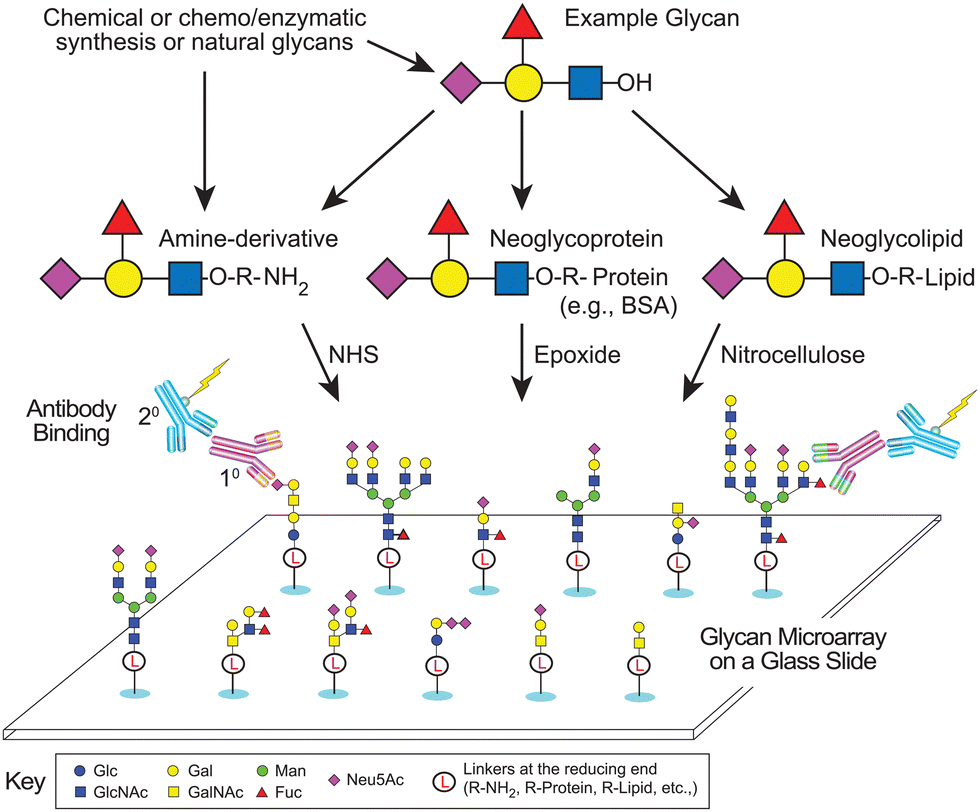Antibody-Glycan Array Service
- Glycan Antigen Recognition Studies
- Vaccine and Therapeutic Antibody Development
- Autoimmune and Infectious Disease Research
- Exploration of Glycoimmunology Mechanisms
Antibody-Glycan Array Service is a specialized analytical platform that utilizes high-density glycan microarray chips to systematically detect and analyze the binding specificity between antibodies and glycan structures. This service employs standardized chip fabrication, precise antibody incubation procedures, and high-sensitivity signal acquisition and data analysis to generate comprehensive glycan-binding profiles, revealing antibody recognition preferences, cross-reactivity, and potential biological functions.
Antibody recognition of glycan structures plays a vital role in immune responses, pathogen recognition, cancer immunology, and autoimmune diseases. Compared with protein or peptide antigens, glycans exhibit a high degree of structural diversity and spatial complexity, making it challenging for traditional immunoassays to accurately characterize antibody-glycan interactions. With the rapid advancement of glycomics and glycobiology, antibody-glycan array technology has emerged as a powerful high-throughput platform for studying antibody-glycan interactions.
The antibody-glycan array is an experimental technique that evaluates the binding specificity and affinity between antibodies and defined glycan structures using high-density glycan microarray chips. Structurally characterized glycans are immobilized on a solid support and incubated with antibody samples. Binding signals are then detected using fluorescently or enzyme-labeled secondary antibodies, enabling comprehensive assessment of glycan recognition patterns, binding profiles, and potential cross-reactivity.
MtoZ Biolabs offers Antibody-Glycan Array Service to generate detailed glycan-binding profiles of antibodies, uncovering recognition patterns, cross-reactivity, and potential targets. This service supports researchers in characterizing antibody-glycan binding behavior, screening for glycan-specific antibodies, and exploring the immunological potential of glycan targets.

Marglous S. et al. Chem Soc Rev. 2024.
Figure 1. Preparation of Glycan Microarrays.
Analysis Workflow
The main workflow of the Antibody-Glycan Array Service is as follows:
1. Sample Preparation
The antibody to be tested is prepared by optimizing the buffer system and adjusting concentration, followed by quality control procedures.
2. Antibody Incubation with Glycan Array
Antibody samples are incubated with the glycan microarray under optimized buffer conditions and controlled temperature.
3. Signal Detection and Image Acquisition
Binding signals are amplified using fluorescently labeled secondary antibodies with high specificity. High-resolution fluorescence scanners are then used to capture signal intensity images for each glycan spot.
4. Data Processing and Visualization
Specialized analysis software is used to quantitatively process the binding signals, generating glycan-binding profiles, heatmaps, and statistical results to identify glycan types recognized by the antibody and assess binding affinity.
Service Advantages
Advanced Analysis Platform: MtoZ Biolabs established an advanced Antibody-Glycan Array Service platform, guaranteeing reliable, fast, and highly accurate analysis service.
One-Time-Charge: Our pricing is transparent, no hidden fees or additional costs.
High-Data-Quality: Deep data coverage with strict data quality control. AI-powered bioinformatics platform integrates all Antibody-Glycan Array Service data, providing clients with a comprehensive data report.
High-Throughput Detection: Capable of simultaneously analyzing glycan-binding profiles of multiple antibody samples, making it suitable for large-scale screening and comparative studies.
Customizable Arrays and Analysis Plans: Glycan types, labeling methods, and data output formats can be tailored according to specific research needs.
Sample Submission Suggestions
Various sample types are supported, including purified antibodies, serum, and plasma. Samples should be stored frozen and shipped on dry ice. To ensure optimal testing results, we recommend consulting with our technical team prior to submission to discuss experimental objectives. A detailed sample preparation and shipping guideline will be provided accordingly.
Applications
Applications of the Antibody-Glycan Array Service include:
Systematically analyze the binding specificity of antibodies to various glycan structures to uncover mechanisms of glycan antigen recognition.
Screen candidate antibodies targeting glycan epitopes and evaluate their binding profiles and cross-reactivity to support the optimization of glycan-based vaccines and therapeutic antibodies.
Investigate immune responses of patient antibodies to specific glycans and explore glycosylation-related disease biomarkers.
Study the interaction patterns between natural or engineered antibodies and glycans to advance cross-disciplinary research in glycobiology and immunology.
Deliverables
1. Comprehensive Experimental Details
2. Materials, Instruments, and Methods
3. Total Ion Chromatogram & Quality Control Assessment (project-dependent)
4. Data Analysis, Preprocessing, and Estimation (project-dependent)
5. Bioinformatics Analysis
6. Raw Data Files
Related Services
How to order?







